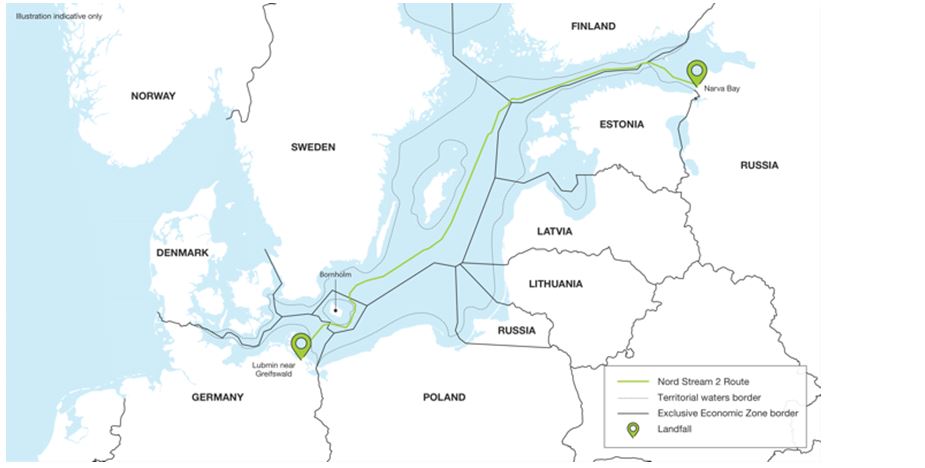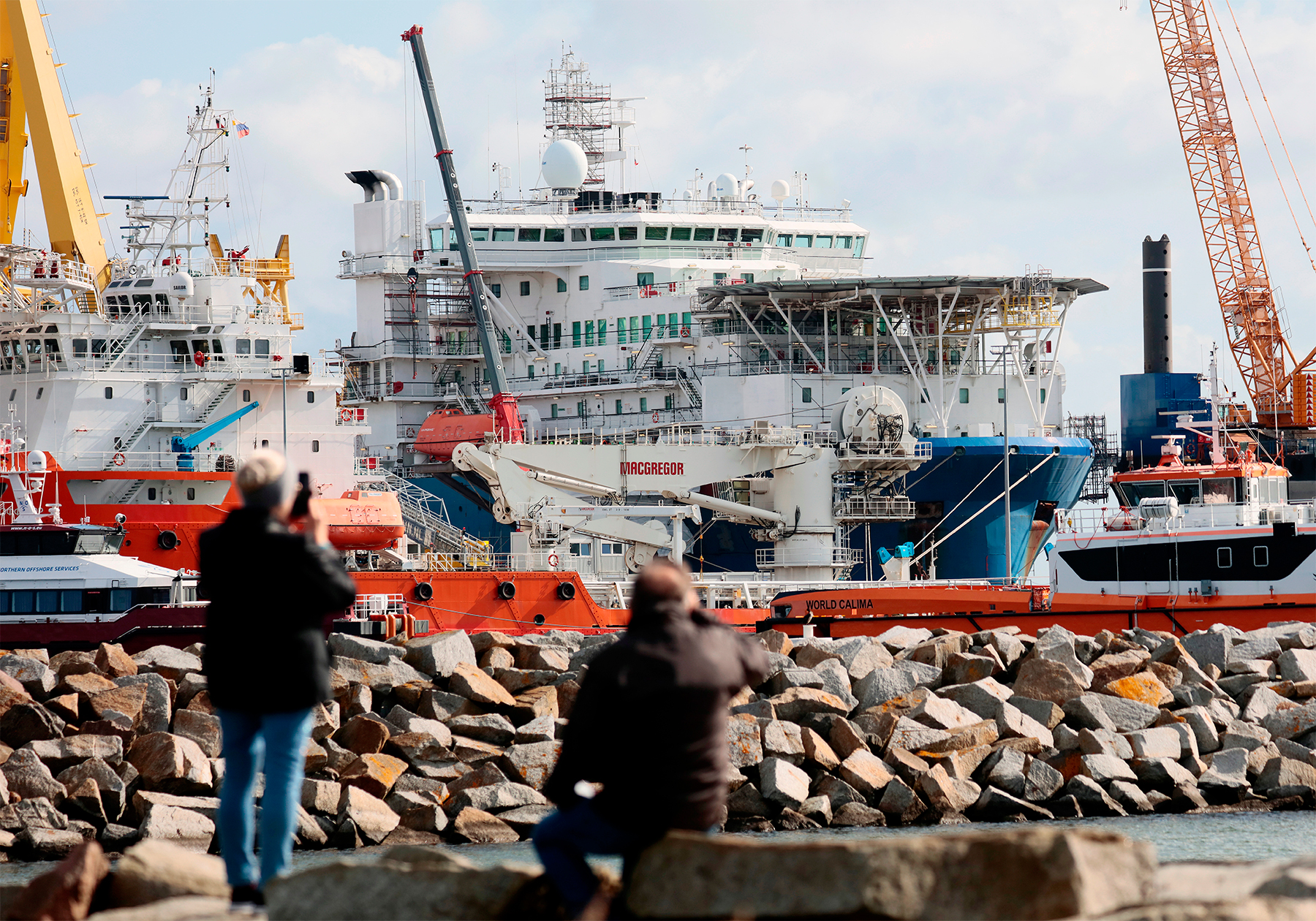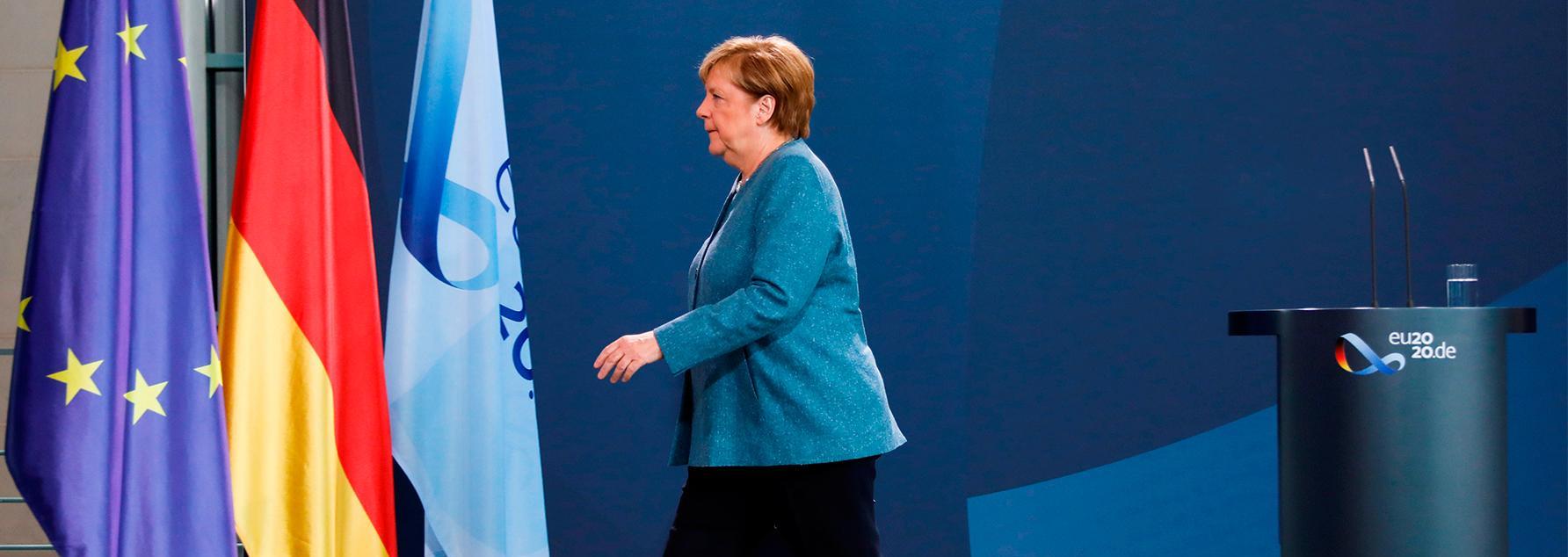On October 7, the French Foreign Minister Jean-Yves Le Drian and his German counterpart Heiko Maas issued a joint statement condemning the “Russian involvement and responsibility” in the Novichok poisoning of Alexey Navalny. In retaliation for the violation of the Chemical Weapons Convention, France and Germany will share several proposals for sanctions with their European partners.
This statement occurs in the complex and unstable context of the Russian-European project, Nord Stream 2. Undermined by threats of U.S. sanctions, this infrastructure venture, surely the most ambitious in Europe, is currently at a standstill.
In Germany, various political figures are voicing their willingness to abandon the project, such as Norbert Röttgen, chairman of the Foreign Affairs Committee of the Bundestag and presidential candidate of the CDU. Another candidate, Friederich Merz, offered to immediately suspend the work for two years in reaction to Navalny's poisoning. Despite these pressures, Angela Merkel can still rely on other supporters, such as the former chancellor, and chairman of the supervisory board of Nord Stream, Gerhard Schröder, or Nils Schmid, the vice-chairman of the SPD group in the Bundestag. The completion of Nord Stream 2 is a major geopolitical issue for both Germany and the EU’s relations with the rest of the world. As the German Chancellor begins her final year in office, the future of the project has never been so uncertain.
Angela Merkel has on several occasions insisted on the absence of a link between the poisoning of Navalny and the construction of Nord Stream 2. While the project has stalled since last year, this speech shows the vital interest of Germany for privileged access to Russian gas. Germany's energy transition depends on it. However, as we have seen, Europe is fundamentally divided on this project. As a true driving force of the European Union, Germany must condemn the poisoning of Navalny, treated in a German hospital, in order to consolidate its leadership.
France, the other great leader of the European Union, is following it in this process. This is why the joint statement of the two foreign ministers, Mr Le Drian and Mr Maas, presented in the introduction underlined the following concerning sanctions: “Proposals will target individuals deemed responsible for this crime and breach of international norms, based on their official function, as well as an entity involved in the Novichok program.” The absence of any mention of the Nord Stream project, while it is at the very centre of current geopolitical tensions, shows the strong will of the two countries to carry out the project.
Completion of the pipeline, which has already cost Russian and European partners more than 9.5 billion Euros, will greatly depend on the treatment of information in key countries, with Germany at the forefront. Time is playing for the United States while Angela Merkel, still faithful to the project, will be replaced within a few months. If the project is not completed or abandoned before the next German election, we can be sure that Nord Stream 2 will occupy a prominent place in the debates.
On October 7, the French Foreign Minister Jean-Yves Le Drian and his German counterpart Heiko Maas issued a joint statement condemning the “Russian involvement and responsibility” in the Novichok poisoning of Alexey Navalny. In retaliation for the violation of the Chemical Weapons Convention, France and Germany will share several proposals for sanctions with their European partners.
This statement occurs in the complex and unstable context of the Russian-European project, Nord Stream 2. Undermined by threats of U.S. sanctions, this infrastructure venture, surely the most ambitious in Europe, is currently at a standstill.
In Germany, various political figures are voicing their willingness to abandon the project, such as Norbert Röttgen, chairman of the Foreign Affairs Committee of the Bundestag and presidential candidate of the CDU. Another candidate, Friederich Merz, offered to immediately suspend the work for two years in reaction to Navalny's poisoning. Despite these pressures, Angela Merkel can still rely on other supporters, such as the former chancellor, and chairman of the supervisory board of Nord Stream, Gerhard Schröder, or Nils Schmid, the vice-chairman of the SPD group in the Bundestag. As the German Chancellor begins her final year in office, the future of the project has never been so uncertain.
What is Nord Stream 2?
Nord Stream is a setup of gas pipelines that would allow Germany to be supplied with Russian natural gas via the Baltic Sea. The first two pipelines were inaugurated in 2011 and are known under the name “Nord Stream 1.”
The Nord Stream 2 project for the construction of two other pipelines was launched in 2018 to double the quantity supplied by Nord Stream 1.
While benefitting from the unmitigated support of Moscow, Nord Stream 2 is a truly European project, driven by 4 countries: Russia (through Gazprom — 51% shares), Germany, (through Wintershall and PEG Infrastruktur — 15.5% each), and France and the Netherlands (9% each, via Engie and Gasunie). In addition, more than 100 companies from 12 European countries are involved in the construction of Nord Stream 2.
The pipeline is a response to Germany's increasing demand for natural gas. The German energetic transition policy aims to reduce coal-burning and close nuclear reactors by 2022. Natural gas is necessary to achieve this transition and could become, according to an article from Reuters, the second pillar of the power supply after renewables.
Nord Stream 2 would allow Russia to transport gas in unmatched quantities to Europe. This competitive advantage, along with the low price of Russian gas, resulted in the United States' strict opposition to the project. Indeed, since the advent of technical innovations allowing the extraction of shale gas and its export as liquefied natural gas (LNG), the USA has become one of the leading gas suppliers in the world. However, the cost of producing American gas is much higher than that of Russian gas. It is therefore easy to understand the American hostility towards the project. On December 21 2019, while Nord Stream 2 was 94% complete, the threat of an American antitrust law to sanction companies involved in the construction of the pipeline led Allseas, a Swiss company, to halt its work. In order to resume work, the consortium has to find another contractor, but other firms fear finding themselves under U.S. sanctions.
American pressure is greatly felt in Europe. Last August, a group of U.S. Republican senators vowed to impose “crushing legal and economic sanctions” on the Port of Sassnitz in Germany. The USA also slowed down the project by putting pressure on the countries concerned by the route, such as Denmark, which was the last one to issue authorization for the pipeline to cross its territorial waters. As one of the major U.S. allies in Europe, Poland’s antitrust watchdog slapped a record $7.6 billion fine on Gazprom, which represents 10% of the Russian company's revenue. Mateusz Morawiecki, the Polish Prime Minister, also called on Germany to halt the Nord Stream 2 project, depicting it as a threat to the stability of Europe.
It is certain that the creation of the pipeline, by stimulating competition, would allow a more reasonable price on the European gas market. Critics of the project fear a dependence of European countries on Russian gas. This argument can easily be questioned. Indeed, Nord Stream 2 in no way prevents other suppliers such as Algeria, Norway, the USA or the Netherlands from supplying gas to European countries to diversify their supply. The central issue is that of a lower price, which, as in all markets, worries suppliers.
Opposition to Nord Stream 2 is not motivated by market share concerns only, as global energy supply flows have an inherent geopolitical dimension. The position of Ukraine epitomizes this intertwining of economic, energy security, and geopolitical aspects. Indeed, Nord Stream 2 would also allow Russia to bypass Ukraine, located on the main current route for European imports of Russian gas—and to deprive it of 2 billion dollars annually, roughly 3% of the country’s GDP. Because of its key strategic position, in the long term, it is in the interest of all countries to maintain a cordial relationship with the latter. This is why the question of its loss of income must be addressed, respected and treated seriously, both by Russia and by its Western partners.
Navalny Poisoning: a Tool in Information Warfare
The objective of this article is not to lift the veil on the unfortunate poisoning of Alexey Navalny but to understand how this affair is treated by the mass media and what impact it has on the Nord Stream 2 project.
On August 20, Alexei Navalny fell ill on a flight between Siberia and Moscow and was placed in a coma for two weeks. Initially hospitalized in Omsk, he was transferred to Germany on August 22, where, following blood work, the Novichok nerve agent was found in his system.
Although the outcome of the Navalny case remains unknown, it is already fueling pro-Western and pro-Russian arguments. First of all, by the communication of Mr Navalny himself, who, via social networks like Twitter or Instagram, accuses the Kremlin of his poisoning.
In the overwhelming majority of Western media who use him as a figure to denounce the Russian system, Alexey Navalny is presented as the primary opponent of Vladimir Putin. The first analysis of the case published by Le Monde (one of the most popular French newspapers) states, “there is a simple truth: political violence is inherent to the Putin system.”
This thesis, depicting Russian power assassinating its opponents, comes from an old narrative framework and reminds us of a collective subconscious very present in Western minds. There are many examples, for example the Skripal Affair recently, but also in Russian history, such as the elimination of Paul I by Catherine II, the sponsored assassination of Trotsky, Alexander I, etc. It is essential to take into account this common bias moulded by the Cold War when analyzing Western media criticism of Russian power.
In the context described previously, the choice of Navalny’s relatives to transport him outside of Russia, to Germany, on purpose or not, necessarily gives a geopolitical and international dimension to his poisoning.
The outcome of this assassination attempt is, at present, murky and difficult to anticipate. Nevertheless, the criticism, analysis and denunciation of the presumed role of the Russian government in the poisoning have made it possible to question the place of Russia in the system of international relations.
The American newspaper Politico clearly highlights the dynamics in Western mass media. In an article dated September 16, Polish Minister of European Affairs Konrad Szymański took a stance on Nord Stream 2. The article headlined, “Navalny poisoning shows why Putin's pipeline must be stopped.” As the article goes on, he denounces the Russian-European project, criticizes German energy consumption and defines the poisoning of Navalny as a "rude awakening" of the danger that Europe runs when dealing with Russia.
Several major European newspapers have used similar arguments, such as The Guardian, Le Figaro, Corriere della Sera or Deutsche Welle. Alexei Navalny is, well beyond his control, a communication tool in the information warfare. His case is instrumentalized and allows different stakeholders to assert their interests.
Nord Stream 2: Revealing Interests and Influences
In this geopolitical chessboard based on communication, some countries have obvious interests. This is the case for the United States, Poland, the Baltic States and Ukraine. On the other hand, Austria's President Alexander Van der Bellen supports the project. After talks with Ukrainian President Volodymyr Zelensky, he declared, “In this particular case, we are talking about diversifying gas supplies. This is a commercial issue.”
Most of the other stakeholders have more ambivalent positions. France, which contributes to the project through the company Engie (whose state has 23.6% of the shares) has a clear economic interest in the realization of the project. However, the country—in a declared approach of rapprochement with Russia since the election of President Macron—is also subject to American influence through its bilateral relations and structures such as NATO.
The American influence is even more visible on Denmark, despite the denial of the Danish government on the interference of foreign powers. The country first authorized the construction of the gas pipeline in its territorial waters on October 30, 2019, a few months after the election of Prime Minister Mette Frederiksen. More recently, in an interview with Danish agency Ritzau, the latter declared, “I've been against Nord Stream 2 from the start” and “I don't think we should make ourselves dependent on Russian gas.”
We can also remember that in July 2020, Mike Pompeo, American Secretary of State, visited Denmark. During this visit, he publicly praised the country's energy policy.
What About the Future?
Angela Merkel has on several occasions insisted on the absence of a link between the poisoning of Navalny and the construction of Nord Stream 2. While the project has stalled since last year, this speech shows the vital interest of Germany for privileged access to Russian gas. Germany's energy transition depends on it. However, as we have seen, Europe is fundamentally divided on this project. As a true driving force of the European Union, Germany must condemn the poisoning of Navalny, treated in a German hospital, in order to consolidate its leadership.
France, the other great leader of the European Union, is following it in this process. This is why the joint statement of the two foreign ministers, Mr Le Drian and Mr Maas, presented in the introduction underlined the following concerning sanctions: “Proposals will target individuals deemed responsible for this crime and breach of international norms, based on their official function, as well as an entity involved in the Novichok program.” The absence of any mention of the Nord Stream project, while it is at the very centre of current geopolitical tensions, shows the strong will of the two countries to carry out the project.
Completion of the pipeline, which has already cost Russian and European partners more than 9.5 billion Euros, will greatly depend on the treatment of information in key countries, with Germany at the forefront. Time is playing for the United States while Angela Merkel, still faithful to the project, will be replaced within a few months. If the project is not completed or abandoned before the next German election, we can be sure that Nord Stream 2 will occupy a prominent place in the debates.








